
Simon Findlay Crean was an Australian politician and trade unionist. He was the leader of the Australian Labor Party (ALP) and leader of the opposition from 2001 to 2003. He represented the seat of Hotham in the House of Representatives from 1990 to 2013 and was a cabinet minister in the Hawke, Keating, Rudd and Gillard governments.

Kevin Michael Rudd is an Australian diplomat and former politician who served as the 26th prime minister of Australia from 2007 to 2010 and June 2013 to September 2013. He held office as the leader of the Australian Labor Party (ALP). Rudd has been the 23rd and current ambassador of Australia to the United States since 2023.

Julia Eileen Gillard is an Australian former politician who served as the 27th prime minister of Australia from 2010 to 2013. She held office as leader of the Australian Labor Party (ALP), having previously served as the 13th deputy prime minister of Australia from 2007 to 2010, under Prime Minister Kevin Rudd. She is the first and only woman to hold either office in Australian history.

Jennifer Louise Macklin is an Australian former politician. She was elected to federal parliament at the 1996 federal election and served as the deputy leader of the Australian Labor Party (ALP) from 2001 to 2006, under opposition leaders Simon Crean, Mark Latham and Kim Beazley. After the ALP won government at the 2007 election, she held ministerial office under Kevin Rudd and Julia Gillard, serving as Minister for Families, Community Services and Indigenous Affairs (2007–2013) and Minister for Disability Reform (2011–2013). She retired from parliament at the 2019 election.
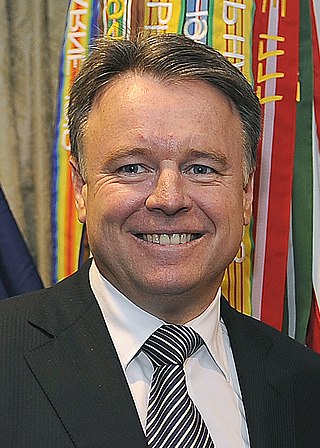
Joel Andrew Fitzgibbon is a retired Australian politician. He is a member of the Australian Labor Party (ALP) and has served in the House of Representatives from 1996 to 2022, representing the New South Wales seat of Hunter. He served as Minister for Defence (2007–2009) in the first Rudd government and Minister for Agriculture, Fisheries and Forestry (2013) in the second Rudd government. He was also Chief Government Whip in the House of Representatives (2010–2013) in the Gillard government.
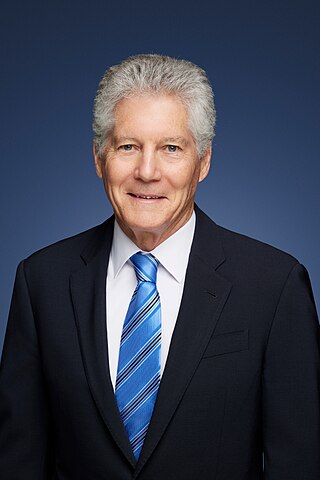
Stephen Francis Smith is an Australian former politician and diplomat serving as the 26th and current high commissioner of Australia to the United Kingdom since 2023. A member of the Australian Labor Party (ALP), he was the federal member of Parliament (MP) for the division of Perth from 1993 to 2013, serving in the Rudd and Gillard governments as minister for Foreign Affairs from 2007 to 2010, minister for Trade in 2010 and minister for Defence from 2010 to 2013.

Wayne Maxwell Swan is an Australian politician serving as the 25th and current National President of the Labor Party since 2018, previously serving as the 14th deputy prime minister of Australia and the deputy leader of the Labor Party from 2010 to 2013, and the treasurer of Australia from 2007 to 2013.

Christopher Eyles Guy Bowen is an Australian politician who has been Minister for Climate Change and Energy in the Albanese government since June 2022. He is a member of the Australian Labor Party (ALP) and was first elected to parliament at the 2004 federal election. He held ministerial office in the Rudd and Gillard governments from 2007 to 2013.
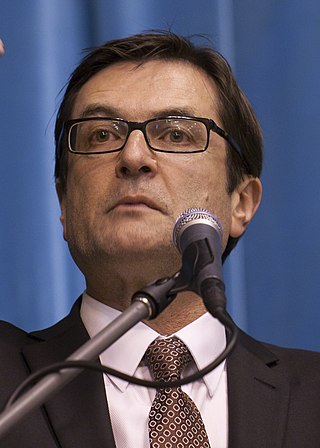
Gregory Ivan Combet is an Australian labour movement leader. He is a former Labor politician and Cabinet Minister, former Secretary of the Australian Council of Trade Unions, former leader of profit-to-member superannuation funds and chair of investment manager IFM Investors. Combet is currently chair of the Australian Government Net Zero Economy Agency which oversights the economic transformation from fossil fuels to renewable energy and net zero emissions.
In Australian politics, leadership spill is a colloquialism referring to a declaration that the leadership of a parliamentary party is vacant and open for contest. A spill may involve all or some of the leadership positions. Where a rival to the existing leader calls for a spill it may also be called a leadership challenge. When successful, it is often said that the former leader has been "rolled". In Australian English the colloquial use of the word "spill" seems to have begun in the mid-1940s with the contest to replace Prime Minister John Curtin after his death on 5 July 1945.

A leadership spill occurred in the Australian Labor Party on 24 June 2010. Kevin Rudd, the prime minister of Australia, was challenged by Julia Gillard, the deputy prime minister of Australia, for the leadership of the Australian Labor Party. Gillard won the election unopposed after Rudd declined to contest, choosing instead to resign. Gillard was duly sworn in as prime minister by Quentin Bryce, the Governor-General, on 24 June 2010 at Government House, becoming Australia's first female prime minister.

The Gillard government was the Government of Australia led by the 27th Prime Minister of Australia, Julia Gillard, of the Australian Labor Party. The Gillard government succeeded the first Rudd government by way of the Labor Party leadership spill, and began on 24 June 2010, with Gillard sworn in as Prime Minister by the Governor-General of Australia, Quentin Bryce. The Gillard government ended when Kevin Rudd won back the leadership of the Australian Labor Party on 26 June 2013 and commenced the second Rudd government.
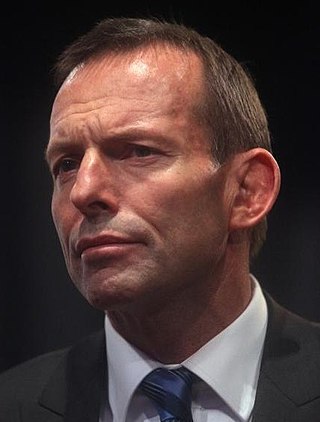
The 2013 Australian federal election to elect the members of the 44th Parliament of Australia took place on 7 September 2013. The centre-right Liberal/National Coalition opposition led by Opposition leader Tony Abbott of the Liberal Party of Australia and Coalition partner the National Party of Australia, led by Warren Truss, defeated the incumbent centre-left Labor Party government of Prime Minister Kevin Rudd in a landslide. It was also the third time in history that a party won 90 or more seats at an Australian election. Labor had been in government for six years since being elected in the 2007 election. This election marked the end of the Rudd-Gillard-Rudd Labor government and the start of the 9 year long Abbott-Turnbull-Morrison Liberal-National Coalition government. Abbott was sworn in by the Governor-General, Quentin Bryce, as Australia's new Prime Minister on 18 September 2013, along with the Abbott Ministry. The 44th Parliament of Australia opened on 12 November 2013, with the members of the House of Representatives and territory senators sworn in. The state senators were sworn in by the next Governor-General Peter Cosgrove on 7 July 2014, with their six-year terms commencing on 1 July.

A leadership spill of the Australian Labor Party (ALP) was held on 4 December 2006. Opposition Leader Kim Beazley was challenged by Shadow Foreign Minister Kevin Rudd, while Deputy Opposition Leader Jenny Macklin was challenged by Shadow Health Minister Julia Gillard in a joint-ticket. Rudd defeated Beazley, after which Macklin resigned, leaving Gillard to become Deputy Leader unopposed.

A leadership spill in the Australian Labor Party, the party of government in the Parliament of Australia, was held on 27 February 2012 at 10 am AEDT, followed by a ballot. The Prime Minister, Julia Gillard, announced the spill at a press conference on 23 February 2012, following the resignation of the Minister for Foreign Affairs, Kevin Rudd, from his cabinet position after months of speculation that he intended to challenge Gillard for the leadership. Rudd announced his intention to seek the leadership at a press conference on 24 February.

A leadership spill of the Australian Labor Party (ALP), the official opposition party in the Parliament of Australia, was held on 28 January 2005. The outgoing Opposition Leader, Mark Latham, stood down 13 months after assuming the leadership in December 2003. Kim Beazley was the only contender for the ballot, and was therefore elected unopposed.
Two leadership spills of the Australian Labor Party (ALP), the official opposition party in the Parliament of Australia, were held on 16 June 2003 and 2 December 2003, respectively. The Opposition Leader, Simon Crean, won the ballot in June against former opposition leader Kim Beazley, but resigned as leader in late November after losing support from his colleagues and did not contest the December ballot which Mark Latham won against Kim Beazley.
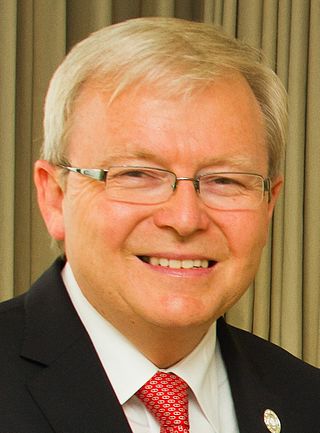
A leadership spill in the Australian Labor Party, the party then forming the Government of Australia, took place on 26 June 2013 at 7:00pm AEST. Prime Minister Julia Gillard called a ballot for Leader and Deputy Leader of the Labor Party live on Sky News Australia at 4:00pm, following persistent leadership tensions. She stated that she would retire from politics if she lost the vote, while calling on any would-be challengers to pledge to do the same if they lost. In a press conference held shortly after Gillard's announcement, backbencher and former Prime Minister Kevin Rudd announced that he would challenge Gillard, whilst also pledging to step down if he did not win the vote. At the ALP caucus meeting, Rudd was elected Leader of the Labor Party, with the caucus voting 57–45 in his favour.

The second Rudd government was the federal executive Government of Australia led by Prime Minister Kevin Rudd of the Australian Labor Party. It commenced on 27 June 2013 and ceased on 18 September 2013. Rudd had previously served a term as Prime Minister from 2007 to 2010 and been replaced by his deputy Julia Gillard, following an internal party spill. Rudd regained the Labor Party leadership by successfully re-challenging Gillard in a June 2013 party spill. On 5 August, Rudd called an election for 7 September 2013, which resulted in the defeat of his government by the Liberal/National Coalition led by Opposition Leader Tony Abbott.

A leadership election was held in October 2013 to select Kevin Rudd's replacement as leader of the Australian Labor Party and Leader of the Opposition. Bill Shorten was elected party leader, and Tanya Plibersek was later confirmed as deputy leader.
















